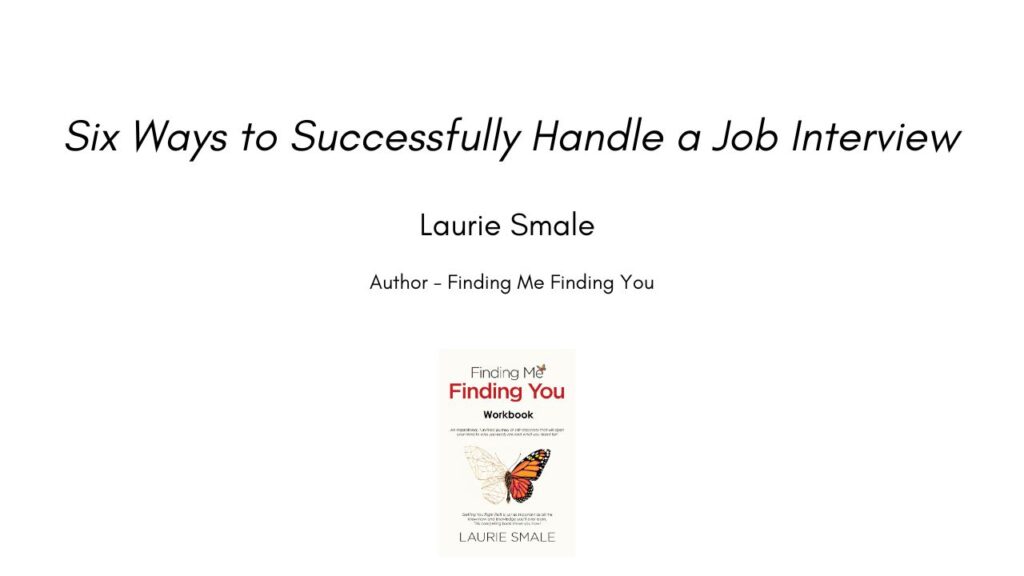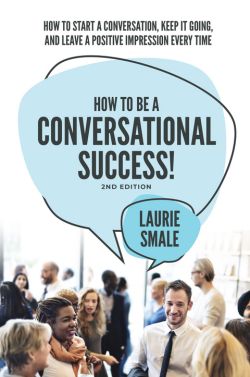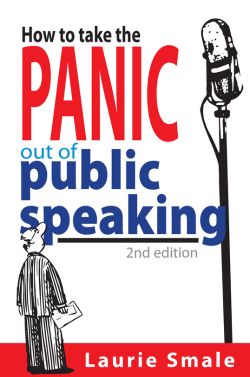Article Six Ways to Successfully Handle a Job Interview
Many interviews are doomed before they take place because people have little idea of what to say or how to handle themselves once they walk through that door. Their understanding of the job requirements has not been given adequate thought as to how they would approach things if given the opportunity. And deep down they really believe they’ll be struggling to get the job.
The positive ideas and inspirations in this article are designed to turn this around and have you go for that job believing in yourself as a worthy candidate to invest in.
With this in mind, assuming that you’re appropriately dressed for the interview and have armed yourself with a professionally prepared CV, here are some sure-fire tips to ensure you’re among the leaders as you near the winning post.
1. Carry Yourself with Confidence. Even if you don’t feel it, act confident as if you really are the person for the job. This helps counter the unnatural, tense situation of the interview. Be aware that the interviewer feels a little awkward and nervous too, even though they mightn’t show it. Accept the fact that it’s normal for everyone to feel a bit uncomfortable in an interview setting. And don’t be afraid to engage in a bit of small talk to break the ice, it really does help.
Remember that interviews cost time and money and the person behind the desk is not out to get you or trip you up in any way. Hopefully you are just the person they’re looking for! So step forward with a firm handshake and the quiet confidence of someone who knows their own self-worth and is eager to learn.
2. Research the Company Beforehand. Before you even think of leaving for the interview get on the Net and find out as much as you can about the company. Now in answer to the question, “What do you know about our company?” you’ll be able to impress the interviewer with some intelligent comment relating to the organization’s recent expansion into South East Asia, their restructuring program, or the new plant they’ve just opened in Melbourne. Fundamental preparation like this will put you oin front of other contenders for the job.
3. Study the Job Requirements. Carefully consider the job requirements in the ad to determine your strengths and weaknesses with regard to this particular position. These are the main things the interviewer will be focusing on. If asked, use specific examples from your experiences to illustrate you understand the essence of each requirement. For those areas you’re not too good at, let them know you learn fast and don’t see it as a problem. Give them an example of where you’ve experienced the requirement under discussion somewhere else. For example an illustration of the initiative you had to show when working in the kitchen at McDonald’s would be ideal.
A young lady once applied for a job as a fire fighter with the Metropolitan Fire Brigade. One of the job requirements was being able to ‘think clearly in time of crisis’ When asked by the interviewer to illustrate what this meant to her, she replied with a story.
When she was a young girl, Mary (not her real name) was often given the daunting responsibility of milking the 200 cows on her parent’s dairy farm in time of need or emergency. This particular day everything was going fine with cows hooked up to the milking machines contentedly chewing their cuds. All of a sudden the boards of one of the elevated platforms on which the cows were standing gave way and sent one of the cow’s back legs crashing through a gaping hole. With no time to reflect on the gravity of the situation, 15-year-old Mary went into action.
Although badly cut and scratched, their prize Jersey Strawberry’s legs had landed on a concrete wall directly beneath the shattered platform. Mary quickly undid the holding-bar from across her neck, released the cups from her udder, and with a great deal of pushing, heaving and shoving, somehow coaxed Strawberry to lift her legs out of this lethal trap. When her parents arrived home from their trip to Melbourne they were astonished to learn that not only had Mary’s quick thinking rescued one of their prize milkers, she’d calmly gone on to finish milking the entire herd!
The interviewer must have been impressed with this response for she was accepted into the rigorous training course and went on to become a professional fire fighter.
4. Prepared Spontaneity. A key factor in whether you get the job or not is your proficiency in handling people. So revisit your personal well of wisdom you’ve gathered along the way. Search out your real-life experiences as a team player, your reliability, how you get along with others, and your leadership qualities. Prepare something specific to say on each of these ‘people’ qualities. You may not need them, but then again you may. I call this prepared spontaneity. You may illustrate the qualities of persistence and reliability with an example of how you put yourself through university with a part-time job. Or you could demonstrate how you are slow to anger by replaying a recent incident where you had every reason to blow your top but didn’t.
5. Be Ready for Unusual Questions. In answer to the question, “What do you see as your strengths?” You might reply, “I feel I get along well with people and would make a good team member.” You would of course be able to expand on this with a specific example that illustrates the point if asked to do so. Conversely, if you were thrown the question, “And what do you see as an area you need to work on?” you could well be in trouble. Here’s how to get around it:
As no one is perfect you’ve got to own up to something! But make sure the human frailty you select is harmless and in no way jeopardizes your chances of getting the job. Here’s what I said when the interviewer leaned back in his chair and threw me the question, “What do you see as your main weakness?” Momentarily thrown, I. told him that my enthusiasm sometimes gets the better of me and I tend to forget that others have valuable ideas to contribute as well as me… But there’s always a little man on my shoulder saying, “Hold back a minute and listen to what they’ve got to say!” This way I turned a negative into a positive by demonstrating that I’m continually working on being a good listener!” In other words my ‘problem’ of being over enthusiastic is under control and no longer a concern.
Not long back one of my daughters went for a job interview and when asked the question, “And what do you see as one of your weaknesses?” She said, “Well there are a couple of aspects of the job I’m a bit worried about, like do I have to know how to fill in all the forms straight away?”
“Oh don’t worry about that”, the interviewer said. “You’ll get lots of training in all that stuff”.
Satisfied with her response, the interviewer moved on. And yes, she did get the job. She told me later that she’d prepared her response to the likelihood of this ‘What’s an area you need to work on’ question before she went for the interview. Make sure you do the same.
6. Rehearse the Interview ‘Live’. Never ever would I speak in front of an audience or conduct a workshop or one-on-one coaching session without first running through the whole thing in my mind. Preparing for an interview is exactly the same. Here’s how: For five to ten minutes a day, a few days before the interview, sit down in a quiet corner and actually ‘see’ the interviewers in front of you and how they’re reacting to what you’re saying in response to their questions about specific job requirements. Don’t be concerned with the exact words you use, unless they’re key phrases or terminology you’d use for effect; just mull over your main ideas for each requirement and let the words intuitively flow as they would in normal conversation. Some of this is out loud; most of it will be in your head.
Especially concentrate on all possible questions they could throw at you and select key ideas and examples with which to answer these questions. Brainstorm a list of possible curly questions they could throw at you then get someone to ask you these questions at random. If you have to do this by yourself write the questions on little pieces of paper, mix them up, then randomly speak to them as if replying to the interviewer. Now you might only have to use one or two of these responses – but you never know. In any case you are prepared for them for you will have created an internal comfort zone within yourself so you’re in control of the situation. Only now are you ready to attend the interview and interact with confidence! If a particular meeting or interview is important to you, you should rehearse it ‘live’ beforehand every time.
In a nutshell
- Break the ice with small talk
- Carry yourself with the quiet confidence of one who believes in themself
- Learn as much as you can about the organization before the interview
- Arm yourself with specific incidents and examples of your positive ‘people’ qualities
- Prepare a response to the questions: “What do you see as your strengths?” “…an area you need to work on?”
- Create an internal comfort zone within yourself by rehearsing the interview ‘live’
So there you have it… everything you need to know to handle yourself effectively in an interview. Remember that being a little on edge and keyed-up is normal, just act more confident than you really feel and this is what they’ll perceive you to be. Study these tried-and-proven tips a few times before any interview and put them into practice for they really do work. Now I can’t promise that you’ll get the job. But I can promise that you’ll give that job you’re after a real nudge!
These tried-and-proven tips reflect the exciting outcomes embodied in my best-selling book, ‘Finding Me, Finding You.’

© Laurie Smale Inspirational Speaker, Speaking Coach, and Author
ARTICLE // Six Ways to Successfully Handle a Job Interview
By Laurie Smale, Author, Finding Me, Finding You 🦋
- Carry Yourself with Confidence
- Research the Company Beforehand
- Study the Job Requirements
- Prepared Spontaneity
- Be Ready for Unusual Questions
- Rehearse the Interview ‘Live’
Read all the details at https://lauriesmale.com/blog/article-six-ways-to-successfully-handle-a-job-interview
All of my practical coaching wisdom is in my three books available at https://lauriesmale.com/books
#lauriesmale #article #findingmefindingyoubook #jobinterview
Shared online Archive.org Facebook Page, Facebook Profile, Google, LinkedIn Page, LinkedIn Profile, Twitter / X








